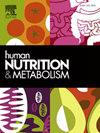超越药物:揭示饮食和生活方式在脂肪肝疾病管理中的作用
IF 1.8
Q3 ENDOCRINOLOGY & METABOLISM
引用次数: 0
摘要
背景:脂肪性肝病(FLD),也被称为肝性脂肪变性,其特征是肝脏中脂肪的积累,可导致炎症、疤痕和严重的肝损伤。FLD的全球患病率正在上升,肥胖、糖尿病和不良生活方式选择等因素加剧了这一趋势。目的本综述旨在探讨饮食和生活方式改变在FLD预防和治疗中的作用。它提供了基于证据的建议,以帮助通过非药物干预减缓疾病的进展。方法利用PubMed Central、Research Gate、National Center for Biotechnology Information、谷歌scholar、Science Direct、National Institute of Health等可靠的在线数据库进行综合文献检索。以脂肪肝为研究对象,选择英文或双语的完整研究或综述文章,排除未发表或不相关的文章。对收集到的数据进行分析,以确定有效的饮食和生活方式来管理FLD。结果研究结果表明,饮食调整,包括减少饱和脂肪和反式脂肪、糖和酒精的摄入,同时增加健康脂肪、复合碳水化合物和瘦肉蛋白的摄入,可以显著缓解FLD症状。有规律的身体活动在控制疾病方面也起着关键作用。结论包括维生素D、维生素E、低碳水化合物、高蛋白(文献结果不一)、低饱和脂肪但单不饱和脂肪酸和多不饱和脂肪酸、鱼肉、坚果、草药(绿茶和柠檬草)和富含生物活性的食品等饮食干预措施是有效的。尽管如此,建议采取更健康的生活方式,即避免吸烟和久坐不动的生活方式,管理合并症,避免不吃饭,以更好地管理和预防FLD。然而,对导致FLD的因素的分析需要更详细、定制化和严格的跨学科研究,以生动地阐明特定饮食成分对FLD治疗的影响。本文章由计算机程序翻译,如有差异,请以英文原文为准。

Beyond medication: Unveiling the role of diet and lifestyle in fatty liver disease management
Background
Fatty liver disease (FLD), also known as hepatic steatosis, is characterized by the accumulation of fat in the liver, which can lead to inflammation, scarring, and severe liver damage. The global prevalence of FLD is increasing, exacerbated by factors such as obesity, diabetes, and poor lifestyle choices.
Aims
This review aims to explore the role of dietary and lifestyle modifications in the prevention and management of FLD. It provides evidence-based recommendations to help mitigate the progression of the disease through non-pharmacological interventions.
Methods
A comprehensive literature search was done using various reliable online databases (PubMed Central, Research Gate, National Center for Biotechnology Information, Google scholar, Science Direct, National Institute of Health and related databases). Full length research or review articles in English or bilingual were selected based on fatty liver disease while unpublished or irrelevant articles were excluded. The collected data were analyzed to identify effective dietary and lifestyle practices for managing FLD.
Results
The findings indicate that dietary modifications, including reduced intake of saturated and trans fats, sugars, and alcohol, alongside increased consumption of healthy fats, complex carbohydrates, and lean proteins, can significantly alleviate FLD symptoms. Regular physical activity also plays a critical role in managing the disease.
Conclusion
Strategic dietary interventions include vitamin D, Vitamin E, low carbohydrates, high protein (varying results found in literature), low saturated fat but mono and poly unsaturated fatty acids, fish meat, nuts, herbs (green tea and lemon grass) and bioactive rich food commodities are impactful. Nonetheless, adopting a healthier lifestyle i.e., by avoiding smoking and a sedentary lifestyle, managing co-morbid disorders, and abstaining from skipping meals are recommended for better management and prevention of FLD. However, analysis of factors causing FLD demands more elaborative, customized, and rigorous interdisciplinary research to vividly elucidate the effect of specific dietary components on treatment of FLD.
求助全文
通过发布文献求助,成功后即可免费获取论文全文。
去求助
来源期刊

Human Nutrition and Metabolism
Agricultural and Biological Sciences-Food Science
CiteScore
1.50
自引率
0.00%
发文量
30
审稿时长
188 days
 求助内容:
求助内容: 应助结果提醒方式:
应助结果提醒方式:


